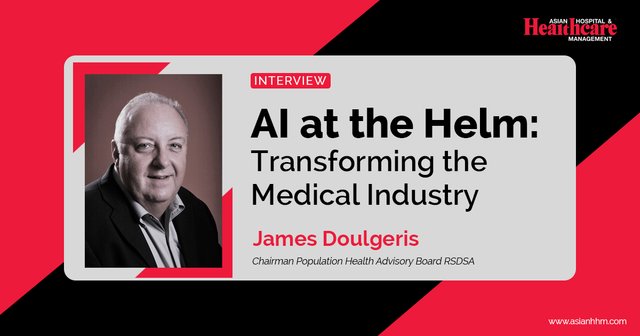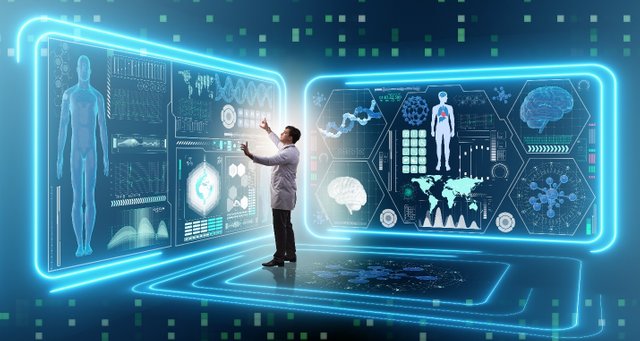
𝗝𝗮𝗺𝗲𝘀 𝗗𝗼𝘂𝗹𝗴𝗲𝗿𝗶𝘀, 𝗖𝗵𝗮𝗶𝗿𝗺𝗮𝗻 𝗣𝗼𝗽𝘂𝗹𝗮𝘁𝗶𝗼𝗻 𝗛𝗲𝗮𝗹𝘁𝗵 𝗔𝗱𝘃𝗶𝘀𝗼𝗿𝘆 𝗕𝗼𝗮𝗿𝗱 𝗥𝗦𝗗𝗦𝗔 interview on 𝗔𝗜 𝗮𝘁 𝘁𝗵𝗲 𝗛𝗲𝗹𝗺: 𝗧𝗿𝗮𝗻𝘀𝗳𝗼𝗿𝗺𝗶𝗻𝗴 𝘁𝗵𝗲 𝗠𝗲𝗱𝗶𝗰𝗮𝗹 𝗜𝗻𝗱𝘂𝘀𝘁𝗿𝘆
- Can you elaborate on how AI is currently being utilized in healthcare, particularly in areas like diagnosis, treatment optimization, and patient care management?
a. Diagnosis:
b. Treatment Optimization:
c. Patient Care Management:

What are some of the most significant advancements AI has brought to medical imaging analysis, and how has this impacted diagnostic accuracy and speed?
a. Enhanced Accuracy:
b. Improved Speed:
c. Early Disease Detection:AI-driven personalized medicine is gaining traction. Could you discuss how AI algorithms are helping tailor treatments to individual patients based on their genetic makeup, medical history, and other factors?
a. Genetic Analysis:
b. Medical History Integration:
c. Considering Additional Factors:

Ethics and privacy are crucial in healthcare AI. How do you ensure that AI systems maintain patient confidentiality and adhere to ethical guidelines?
a. An Ethical Review Board:
b. Data Encryption:
c. Access Control:
d. Anonymization and Pseudonymization:
e. Transparent Logic Trees:
f. Regular Audits:
g. Compliance with Regulations:
h. Continuous Training:
i. Informed Consent:
j. Accountability and Responsibility:One of the challenges with AI in healthcare is the interpretability of algorithms. How do you address the "black box" issue to ensure transparency and trustworthiness in AI-driven decisions?
a. Interpretable Models:
b. Post-hoc Explanation Techniques:
c. Model Documentation:
d. User-Friendly Interfaces:
e. Transparency Reports:
f. Continuous Evaluation and Validation:
g. Regulatory Compliance:Integrating AI into existing healthcare systems can be complex. What are some strategies for successful AI adoption in hospitals and clinics, considering factors like interoperability, data security, and staff training?

- The role of AI in drug discovery and development is expanding. Can you discuss how AI algorithms are revolutionizing the pharmaceutical industry, from molecule design to clinical trials?
a. Virtual Screening:
b. Generative Models:
c. Drug Repurposing:
Optimization of Clinical Trials:
a. Patient Stratification:
b. Predictive Analytics:
c. Real-world Evidence (RWE):
Drug Development and Manufacturing:
a. Process Optimization:
b. Quality Control:
Personalized Medicine:
a. Precision Prescribing:
b. Companion Diagnostics:
AI has the potential to reduce healthcare disparities. How can AI technologies be leveraged to improve healthcare access and outcomes for underserved communities?
Regulatory frameworks for AI in healthcare are evolving. What are the current challenges and opportunities in ensuring regulatory compliance while fostering innovation in AI applications?
Interdisciplinary collaboration is essential for AI success in healthcare. How do you encourage collaboration between data scientists, healthcare professionals, policymakers, and industry stakeholders to drive AI innovation?
Looking ahead, what are the key trends and future developments you anticipate in AI's role in transforming the medical industry, and how should stakeholders prepare for these changes?
In your opinion, what do you see as the most significant opportunity or challenge that AI will face in the next five years in its ongoing transformation of the medical industry, and how do you think stakeholders should address it?
Click here for full interview to know more point to point: https://www.asianhhm.com/interviews/ai-at-the-helm-transforming-the-medical-industry